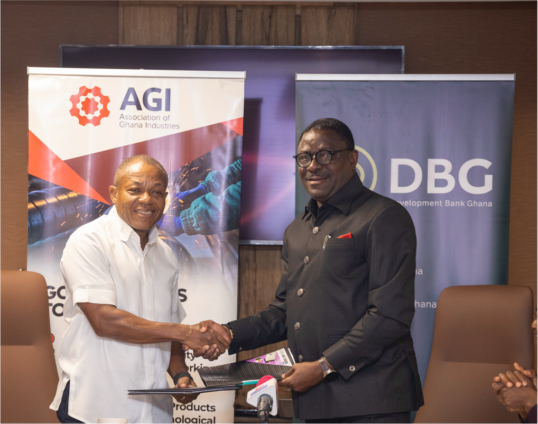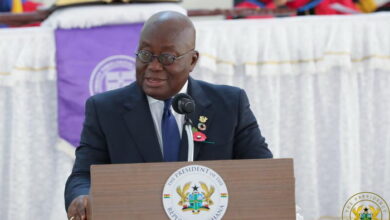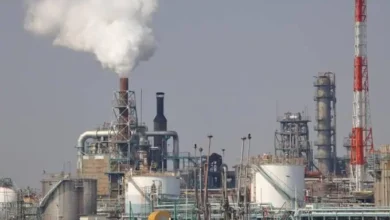Development Bank Ghana and AGI Join Forces to Revitalise Ghana’s Textile and Garment Industry
Development Bank Ghana and AGI Join Forces to Revitalise Ghana’s Textile and Garment Industry

- DBG has entered into MoU with AGI to drive the growth of key sectors in Ghana’s economy
- Through this MoU, DBG and AGI will launch a three-year initiative to provide essential support
- As part of the initiative, DBG will initially invest GHS 566,200 to support AGI in executing various activities.
The Development Bank Ghana (DBG) has entered into a Memorandum of Understanding (MoU) with the Association of Ghana Industries (AGI) to drive the growth of key sectors in Ghana’s economy.
This partnership specifically targets the revitalisation of the textiles and garments industry.
The collaboration seeks to empower local businesses by enhancing production capabilities, improving competitiveness, and creating job opportunities. Through this MoU, DBG and AGI will launch a three-year initiative to provide essential support to textile, garment, and fintech companies.
The programme will tackle critical challenges such as high production costs, limited skilled labour, and a lack of access to long-term financing.
DBG’s CEO, K. Duker, emphasized that the bank’s support for the textiles and garments sector is in line with its strategic focus on advancing the manufacturing industry.
He stated, “This collaboration with AGI provides an opportunity to support the sector’s growth by tapping into global trade opportunities, including AfCFTA and AGOA. Together, we will help local businesses overcome barriers, expand production capacity, and reach new markets, thereby contributing to the strengthening of Ghana’s economy.”
As part of the initiative, DBG will initially invest GHS 566,200 to support AGI in executing various activities.
These include identifying at least three investable projects within the textile and apparel value chain, offering technical assistance, supporting market development, conducting capacity-building sessions, and performing regular monitoring and evaluation to measure the impact of the programme.
DBG also plans to invest at least GHS 100 million annually over the next three years, through partnerships with financial institutions and development partners, to provide long-term financing to Ghana’s textile and garment industry.
Furthermore, DBG’s Guarantee subsidiary, DBG Guarantee (DBGG), will play a crucial role in unlocking additional financing by offering partial credit guarantees to businesses, enabling them to expand and invest in their growth.
Dr. Humphrey Kwesi Ayim Darke, President of AGI, highlighted that DBG’s efforts to provide access to funding and technical support are addressing the unique challenges faced by local textile and garment companies. “This partnership will empower businesses to enhance operational efficiency, create jobs, and access both local and international markets,” he said.
Professor Eric Osei-Assibey, DBG’s Chief Economist Designate, also spoke at the ceremony, underscoring the significant potential of the textile and garment sector to drive Ghana’s economic growth. He noted that, in addition to financial and technical support, there would be a strong emphasis on integrating sustainable manufacturing practices, such as recycling textile waste and adopting eco-friendly production methods. This focus on sustainability will help ensure that the industry grows in a responsible manner, benefiting both the economy and the environment.
This initiative is expected to improve the competitiveness and operational efficiency of the participating companies, create jobs, and expand market linkages, thus boosting Ghana’s export potential. Ultimately, the partnership between DBG and AGI marks a crucial step towards revitalising the textiles and garments industry, laying the foundation for long-term economic growth and sustainability.





